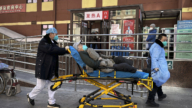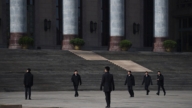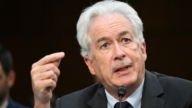【新唐人2014年01月29日訊】中國大陸去年的房地產市場可用「高燒不退」來形容,不過進入2014年,多位業內大腕和專家、學者都表達了對樓市的不同看法。「華遠地產」董事長任志強十幾年來第一次提出房地產風險,大陸經濟學家謝國忠甚至預測,大陸房價在2014年會下跌50%。
去年,大陸新建商品住宅,與上年同月相比,70個大中城市中,價格下降的城市有1個,上漲的城市有69個,其中北京、上海、廣州、深圳4城市,年度漲幅都超過了20%。而去年房地產企業全年銷售額超過百億的達71家,有6家房企更是突破一千億。
21號,大陸「華遠地產」董事長任志強在一個地產頒獎典禮上表示,目前最擔心的是,大陸房地產開發商還認為,今年的房地產市場保持著和去年一樣的漲幅。他說:「我做了十幾年房地產報告,今年第一次提出『風險』兩個字。」他預測,今年房企銷售增速,可能不到百分之十。
1月18號,在一個地產峰會上,任志強指出,由於中央政府的調控政策錯誤,導致供求關係逐步惡化,今年房價增幅下滑是必然的。
大陸「萬達集團」董事長王健林也表示,很多二線城市已經出現房子賣不動的跡象,再加上流動性收緊,大可不必擔心今年房價會飆升。
大陸經濟學家謝國忠,日前接受北京「全球財經新見地《BWCHINESE》」中文網站的專訪時指出,最後一波房地產泡沫是靠高利貸推起的,現在高利貸出了問題,房價也支撐不住了。他預測,今年大陸房價會下跌50%。
而大陸經濟學者楊斌認為,大陸房價非常不合理,但要下跌,沒那麼簡單。
大陸經濟學者楊斌:「中國的房價本來就泡沫,北京周邊的房價就高於美國別墅的價格,非常誇張,非常不合理。是不是2014年,如果跌的話,我估計也要下半年去了,不是那麼簡單。嚷嚷也不是3年、5年了,誰都解決不了,它就這麼著,這就中國特色。」
而大陸經濟學者芧于軾表示,房產泡沫的形成有4個原因。
大陸經濟學者芧于軾:「一個是經濟的高增長,第二個是收入分配的不平均,下一個是富人的錢沒有地方去投資,四是土地政策,市場被壟斷了。降到百分之五十,就是泡沫破裂。那很糟糕的,建築業,尤其百萬人就業就要失業了,房地產的上游下游的工業都要受影響,整個GDP要降低下來。」
不過,大陸資深地產策劃人「徽湖」日前發表博文《土地盛宴讓地方政府成「土豪」》,文中指出,這些年來,全球經濟中國一枝獨秀,最根本的原因就是房地產的高速發展。
中共國務院直屬事業單位「國家行政學院」教授許正中,最近也向媒體表示,確實有政府主導、推動的城鎮化綁架房地產的現象。在現有體制下,地方財政支出責任大,不得不靠融資平臺大規模舉債。為了償債,房地產成為「二財政」和「提款機」,有的地方甚至成為「主財政」和「搖錢樹」。
謝國忠認為,房產泡沫破滅對中國是大好事。楊斌也表示,房價高只有開發商和地方政府得利。
楊斌:「我希望它跌下來,誰都希望它跌下來,這太不合理了。大陸人一生的收入還買不到房子,政府聯合開發商,就他們賺錢,政府賣地,開發商賺錢,然後壟斷價格,把老百姓一生的勞動一次性剝奪。645房價嚴重影響中國消費能力,一個房價就把你消費能力全都打壓了。」
據官方粗略估計,地方政府和銀行2012年從房地產獲得收入4萬7917億元,佔全年房地產業銷售額6萬4000億元的75%。地方政府從房地產行業拿走的土地出讓金和稅費比例偏高,已成不爭的事實。
英國《經濟學人》週刊最近報導說,大陸的房產市場令人擔憂,一些富商巨賈,如中國最大住宅開發商「萬科集團」董事長王石,和香港首富李嘉誠,都已經對大陸房產的泡沫化現象採取應變措施。
採訪/常春 編輯/陳潔 後製/郭敬
Chinese Realtor: 2014 Real Estate Risk Falling Prices
The Chinese real estate market was booming last year.
However, real estate tycoons and experts have different views
on the Chinese market for 2014.
Beijing Huayuan Property Chairman Ren Zhiqiang discussed
real estate risk using more than a decade of real estate career
experience.
Economist Andy Xie predicted a 50% fall of the Chinese
property market value.
Last year, new property prices rose in 69 cities except one.
The annual increase rate was more than 20% in Beijing,
Shanghai, Guangzhou, and Shenzhen.
As many as 71 real estates have made over 10 billion yuan in
sales last year, six even made more than 100 billion yuan.
Beijing Huayuan Property Chairman Ren Zhiqiang revealed
his worry over real estate on January 21 at a real estate event.
Even though the Chinese realtors believe the market will remain
the same gains as last year, he said, “I have done more than
10 years of real estate reports. This year, for the first time,
I am talking about the risk.”
He predicted that sales growth in 2014 may be less than 10%.
In a summit on Jan. 18, Ren Zhiqiang pointed out that, central
government’s control policy errors have led to a gradual
deterioration of supply and demand, the decline in the price
increases this year is inevitable.
Dalian Wanda Group Chairman Wang Jianlin also indicated
sales have staggered in many second-tier cities, with the slow
down on demand, the price is unlikely to soar this year.
In an exclusive interview with Chinese Business Wisdom,
economist Andy Xie said that the last wave of the real estate
bubble was pushed up against money lending.
The real estate prices will not stand in the face of cash flow
Issues and he predicted that house prices will drop by 50%.
Economist Yang Bin believes the unreasonable real estate
prices are doomed to fall but, not so easily.
Yang Bin, economist: “China’s housing prices have been a
growing bubble.
Prices in Beijing have been exaggerated and unreasonably
higher than similar in the United States.
Is it going to be 1024? Even if the price drops, I believe it will
be in the second half of the year.
It is not so simple. It has been going like this for these years.
No one can resolve it and this is the Chinese characteristic."
Economist Su Yushi analyzes the four reasons contributing to
the formation of the housing bubble in China.
“Firstly, it is the high growth in economy.
Secondly, uneven distribution of income, thirdly a lack of
investment means for the wealthy people.
Fourth is the market has been monopolized due to the land
policy. The 50% price fall means the burst of the bubble.
That will be very bad for the construction industry.
Millions of people will lose their jobs.
Both upstream and downstream of the real estate industry
will be affected. The entire GDP will go down."
Senior estate planner Hui Hu recently published a blog titled:
“The land feast makes local government the Tyrant" stating
rapid real estate development in China has made it’s economy
thrive in the world.
Chinese Academy of Governance Professor Xu Zhengzhong
also recently told the media that the urbanization governed by
the regime indeed drove real estate.
Under the current system, the mass local fiscal expenditure
has relied on enormous financing platforms.
To pay back the debt, real estate has become the alternative
fiscal and cash machine, and even the main financial source
and cash cow for some places.
Andy Xie believed that China’s real estate bubble bursting
is a good thing.
Yang Bin also says that the high prices only benefits
developers and local governments.
Yang Bin: “I want the bubble to fail. We all hope it will fail.
It’s too unreasonable. The average Chinese lifetime income
can’t manage to buy a house.
The government works with the developers. They make the
profit, one sells the land, and the other make the money.
They monopolize the industry and deprive people of their
life-time hard work.
The high price has seriously affected the spending power of
China. The house prices kill the entire spending power."
According to official estimates, local governments and banks
received 4.8 trillion yuan revenue from real estate in 2012.
This accounted for 75% of the total real estate sales
of 6.4 trillion yuan.
It has become an indisputable fact that local governments
charge exceedingly high land transfer rates and taxes.
The Economist magazine recently reported that some of
China’s biggest property moguls appear to be growing uneasy.
Wang Shi, the chairman of China Vanke, the country’s largest
residential property firm by volume, and Li Ka-Shing, a Hong
Kong tycoon, have both taken contingency measures to
deal with the bubble market.
Interview/ChangChun Edit/ChenJie Post-Production/GuoJing

























